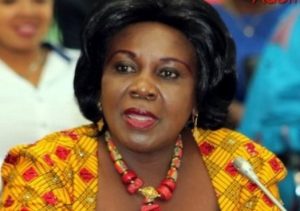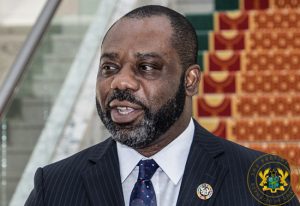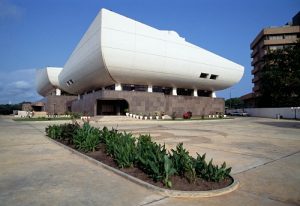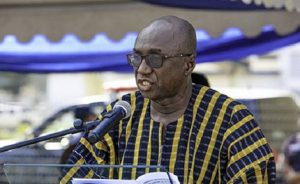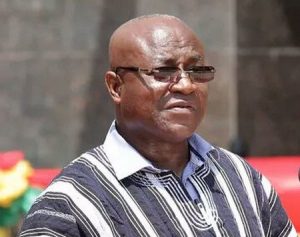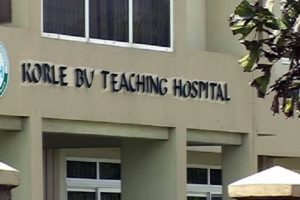The Minister of Local Government and Rural Development, Hajia Alima Mahama has reacted to concerns that there was a deliberate misinformation campaign initiated by the government on the December 17 referendum.
The National Democratic Congress (NDC) at a press conference on Tuesday afternoon [November 12, 2019] alleged that the government was deliberately “misleading” the public on the question to allow partisan participation in local level elections.
The NDC has therefore urged voters to vote “NO” during the December 17, 2019, national referendum on whether or not the 1992 national constitution should be amended to open up local government elections to partisan participation.
According to the NDC, a “YES” vote will further polarize the nation, particularly local communities along the lines of NPP / NDC, and will likely lead to the creation of “NDC Communal Labour day” and “NPP Communal Labour day”, as well as “NDC market” and “NPP market”.
To the NDC, there was deliberate misinformation in the public domain that voting “YES” in the referendum was a decision that Metropolitan, Municipal and District Chief Executives would now be elected.
Hajia Alima Mahama’s response
But responding in a radio interview on Accra based Joy FM on Tuesday evening, which was monitored by Graphic Online, Hajia Alima Mahama said the government made the roadmap clear when it announced the plans for the referendum and the conversation since day one has been on electing MMDCEs on partisan basis.
She said the Afrobarometer report of 2018 indicated that 69 per cent of the Ghanaian public wanted to see MMDCEs elected and elected on partisan basis.
In addition, she said the Minority in Parliament’s position from day one has been on electing MMDCEs on partisan basis .
Hajia Mahama, therefore, said the NDC’s argument at a press conference Tuesday afternoon was a sharp contrast to what their MPs pushed for in Parliament and expressed surprise at the contrast position by the party.
“Go and look through the [Parliamentary] Hansard [of July 29, 2019] and see their arguments on that day,” she said
“No, there is no mis-campaign or misinformation. The whole process of the referendum started with the discussion of election of MMDCEs. And the Ministry of Local Government prepared a roadmap on this matter and government took a decision that, we have to move towards election of MMDCEs on partisan basis and I shared the roadmap with everybody, I had two different media encounters, we had regional sensitisations, all parties were invited, we had national sensitisation, we met with party people and in the roadmap we stated that the first step towards electing our metropolitan, municipal and district chief executives is amendment of Article 55(3) of the 1992 constitution, an entrenched clause, we need to amend it to pave way for election of our MMDCEs on partisan basis, pave way for political parties to participate in district level elections, including MMDCEs. So the whole conversation about amendment of Article 55(3) started because the decision was taken to elect our MMDCEs on partisan basis,” Hajia Mahama said.
Adding, Hajia Mahama stressed:
“We even went into this issue of amending Article 55(3) because the decision was taken to elect MMDCEs on partisan basis. Then we said there are two fundamental provisions of the constitution, Article 243(1), that is not an entrenched clause, it has to be done by Parliament and with two-thirds majority, we had it approved. We’ve gone through all the motions on Article 243(1), it was sent to Parliament, sent to Council of State for advice, sent to Parliament, sent to the Committee on Constitutional, Legal and Parliamentary Affairs, they debated on it, came up with a consensus for us to approve Article 243(1) to allow for election of MMDCEs and what does the Bill say? An amendment to read, ‘Each shall have a District Chief Executive who shall be elected to office by Universal Adult Suffrage within the district. This went to Parliament, the final second reading was on 22nd July [2019], we debated this and we are anticipating a vote. Our Minority side said if we amended it, if they voted for 243(1) amending it, that will mean that we can elect MMDCEs…, but we had to hold on to it for further discussions on that, so for me today, I’m so surprised that they are now saying that they do not want to see MMDCEs elected on partisan basis. And Article 55(3) yes, it is about non participation of political parties in district level elections. 55(3) says that political parties can sponsor candidates in elections to public office either than district level elections. So it is important to amend it so that, a decision to elect MMDCEs on partisan basis can go through. If we amend Article 243(1), we can have MMDCEs elected but not on partisan basis, so 55(3) is to allow for, whilst we amend 243(1), amendment of that and then have our election of MMDCEs on partisan basis. That’s why we made the link. That conversation of amendment of Article 55(3) will not have even started at all.
But contributing in the same radio interview on Joy FM on why the NDC was campaigning for “NO”, Professor Kwamena Ahwoi said the Minister’s position was a position that should be avoided.
“We are talking about amending Article 55(3), the NDC’s position is that, 55(3) has nothing to do with the election of MMDCEs. They keep bringing in electing MMDCEs to confuse the issue. 55(3) is primarily allowing political parties to sponsor candidates to district assembly and unit committee elections, that is what the amendment of 55(3) is basically trying to do. Electing MMDCEs is tangential as she [Hajia Alima] rightly said, you can elect MMDCEs without having them by political parties and you do that by amending Article 243(1), which requires two-thirds of Parliament.
“If you remember and this is where the muddying the waters comes in. Last week the President [Akufo-Addo] made a statement which was bewildering, he said, ‘the power that you gave me to appoint DCEs, I am now turning that power over to the people to elect the DCEs, so you must vote YES at the referendum’. That is false, amending 55(3) will not allow anybody to elect DCEs, it is amending 243(1) that will allow people to elect the DCEs, so if on the 17th, what we are voting on is a referendum to amend 55(3), we should not be talking about electing DCEs, because as the Minister rightly said, you can elect DCEs on a non-partisan basis, you can also elect DCEs on the basis of what we put in our manifesto. In our manifesto we said that we support the election of DCEs on the basis of the Fiadzo Constitutional Review Committee report. And did the Fiadzo report say, it said the President must nominate five candidates, they will attend an interview at the Public Services Commission for their competence to be determined, the Public Service Commission will select three of them and those three will stand for election, directly by the people on the basis on Universal Adult Suffrage. So there are many many ways of electing DCEs. DCEs don’t have to be elected on the basis of party politics, so we must keep the two arguments separate. You amend Article 55(3) to make the local government system partisan, you don’t amend it to elect DCEs. You amend Article 243(1) to elect DCEs, those elections don’t have to be in partisan basis, if we keep these two arguments separate, the confusion will evaporate,” Prof Ahwoi said.
Disagreeing with Prof Ahwoi’s position on not making local level elections partisan, Hajia Alima said there was a consensus on the floor of Parliament to make it on partisan basis.
She said the July 29, 2019 Parliamentary Hansard which contains the argument of the Minority and Majority sides of Parliament indicates a consensus on electing MMDCEs on partisan basis and the Minority side on the floor of Parliament said: “We are hesitant to amend Article 243(1) because we want to have the referendum because we want to have our MMDCEs elected on partisan basis. So it is important that we go for the referendum, get 55(3) amended and then before we amend 243(1), and we (Majority) said no, let’s amend 243(1) first and then we have the referendum, so we have both amendments.
“And I’m surprised that in NDC press conference today, they indicated that we should bring 243(1) to Parliament, its already in Parliament, it has gone through the committee stage and we have debated it on the floor of the Parliament.”
Prof Ahwoi said a Parliamentary consensus if it occurred at all is not a national consensus but Hajia Mahama reacting disagreed with that position and said, she was “seeing opportunistic tendencies” in Prof Ahwoi.
“There are only two parties in Parliament, there are 26 registered political parties. If you want a national consensus, you don’t go and meet and put two parties in Parliament together and say that you have got a consensus, what about all the other registered political parties, what about the people who don’t belong to any parties at all, that is why we are saying if the government had been sincere, all they needed was a national stakeholders conference, to involve not just two Parliamentary parties but all stakeholders, the political parties, the chiefs …so that we agree on what we want to do.
To Prof Ahwoi, the bill for the referendum should be withdrawn, reach a consensus, development a national blueprint, not just on the amendment bill, but also on all the consequential matters on electing MMDCEs before going ahead
Asked why he was coming up with this suggestion when next week the first amendment [Article 243(1) will come up for voting in Parliament, Prof Ahwoi said: “I am not a member of the Minority, I am not a member of our party [NDC] executive, I only provide advice …”
He also added that, even though there were only a few days left for the referendum, “its better late than never.”
Source: Graphic.com.gh


